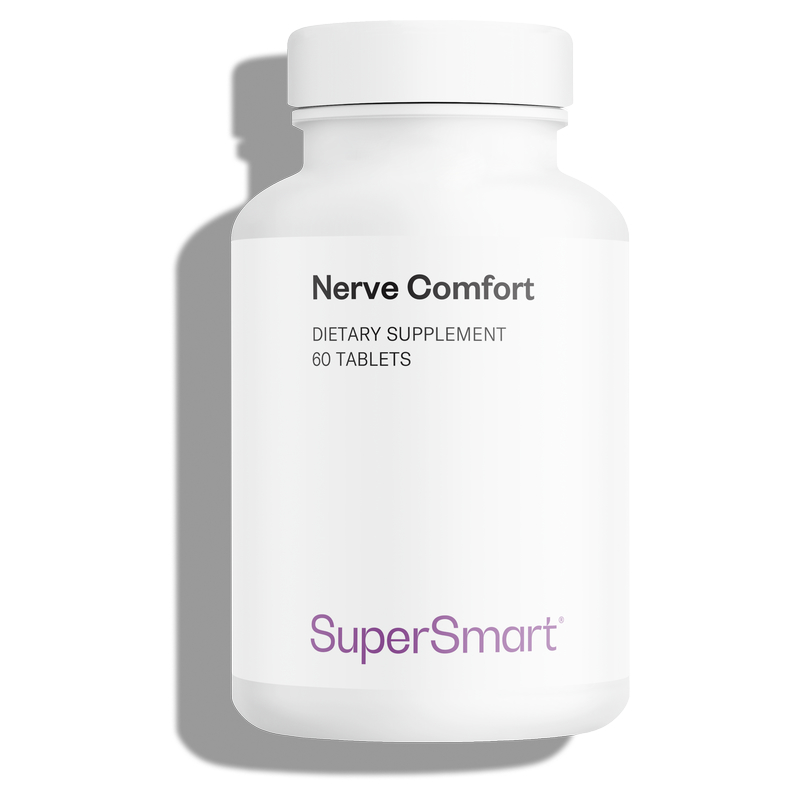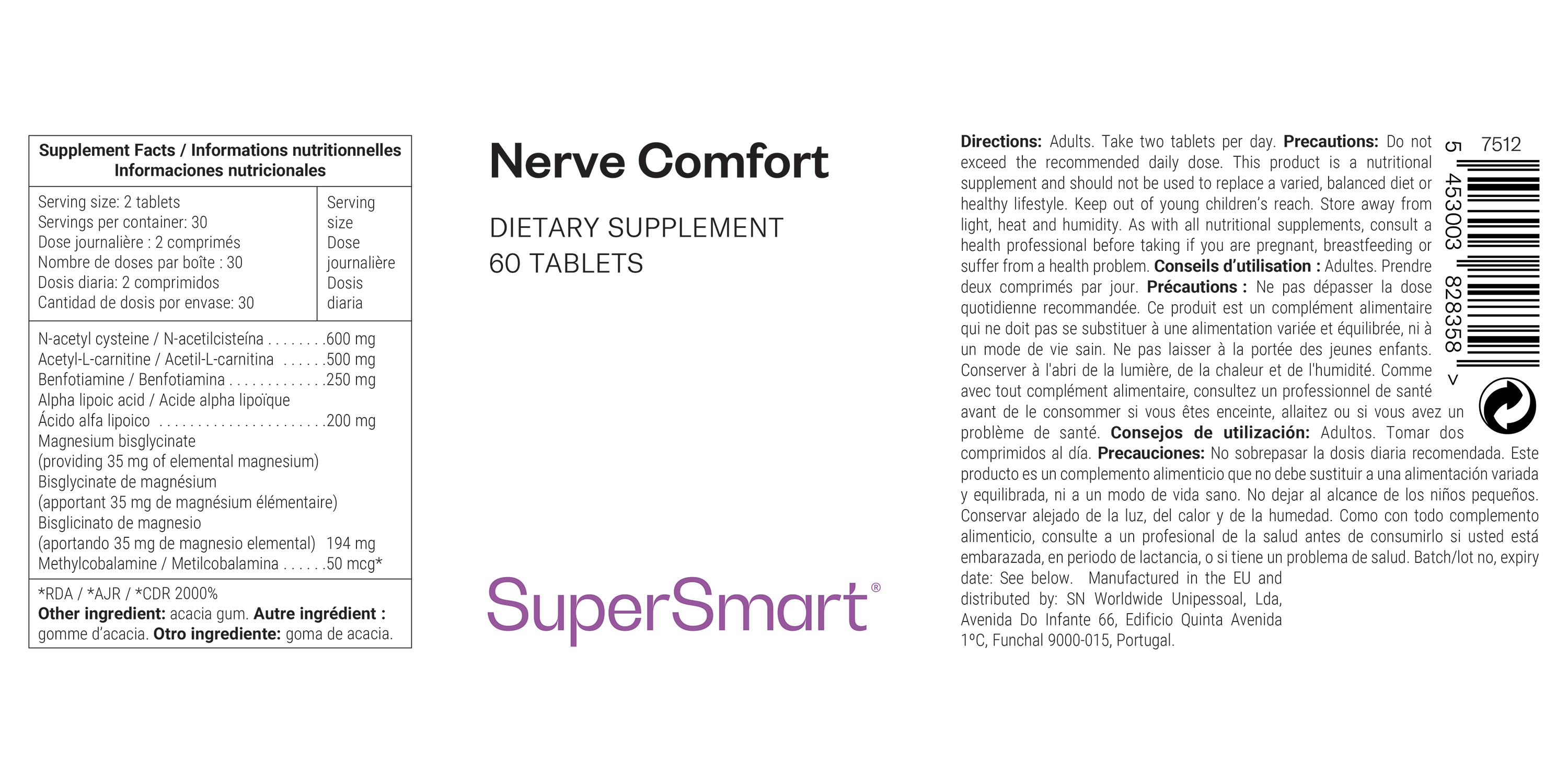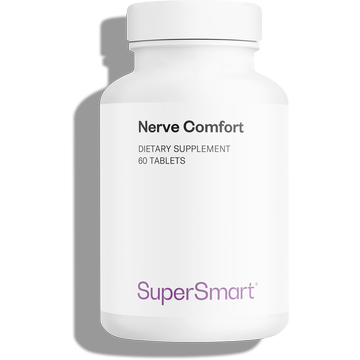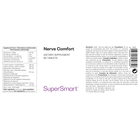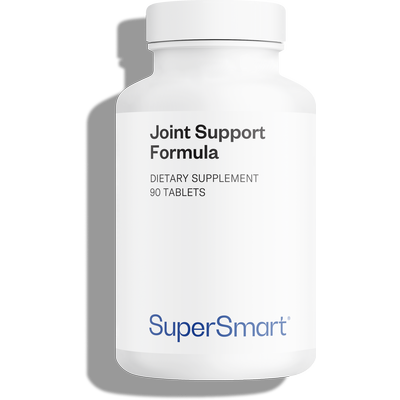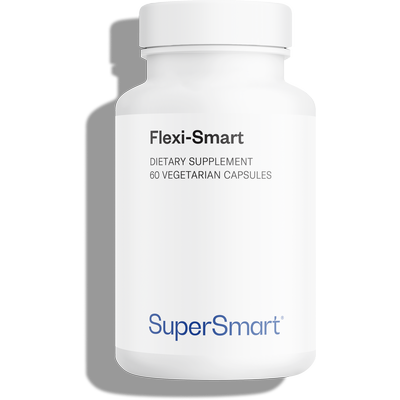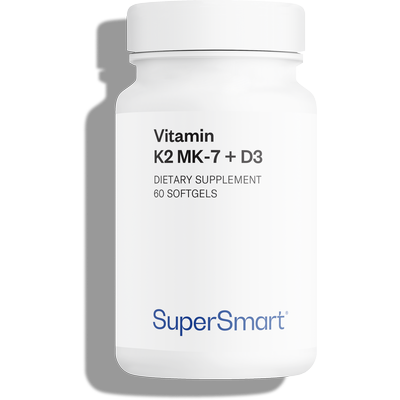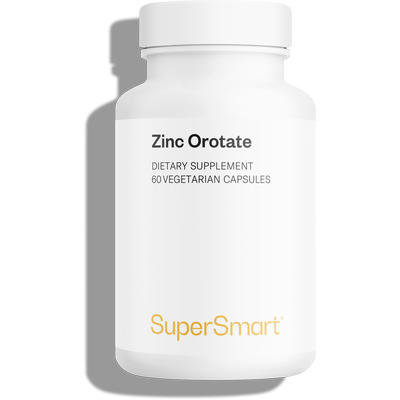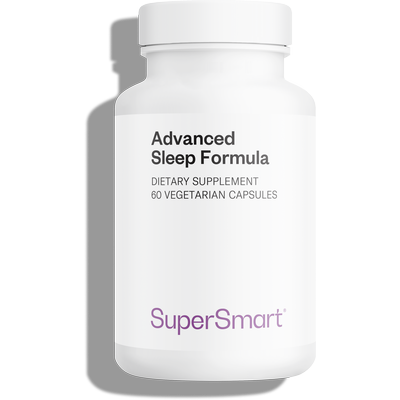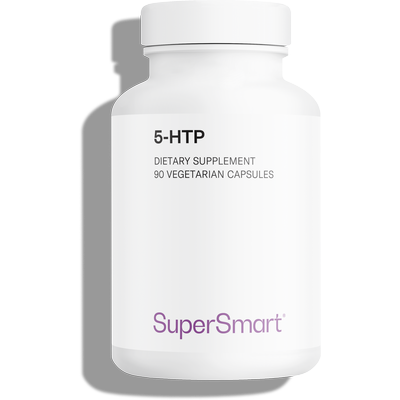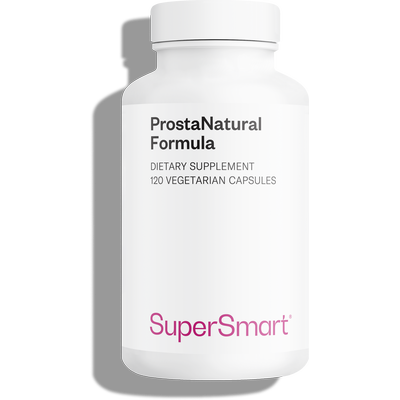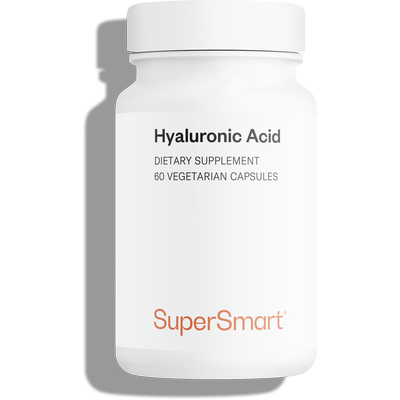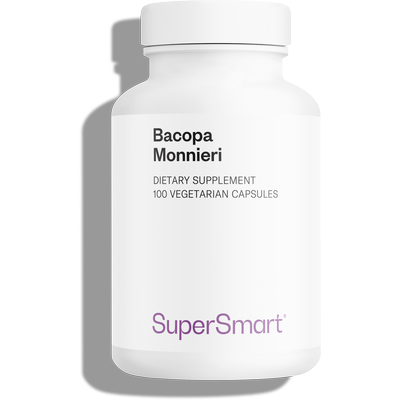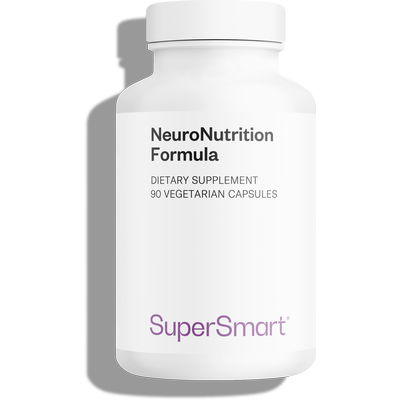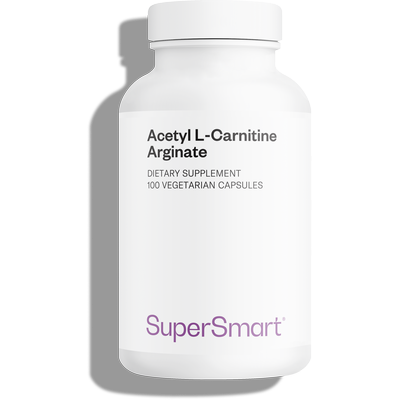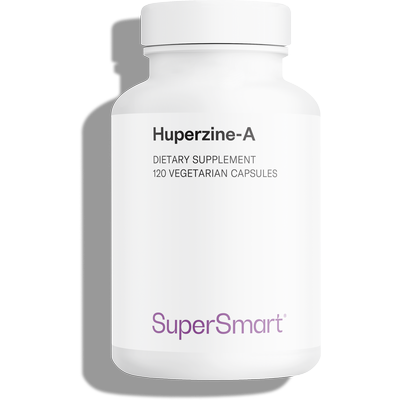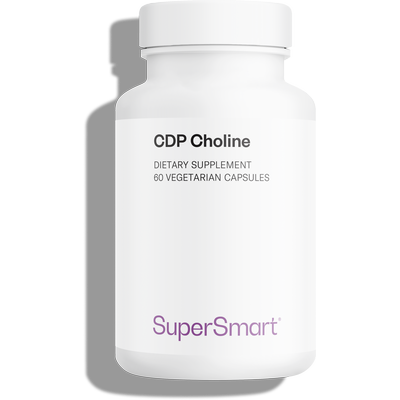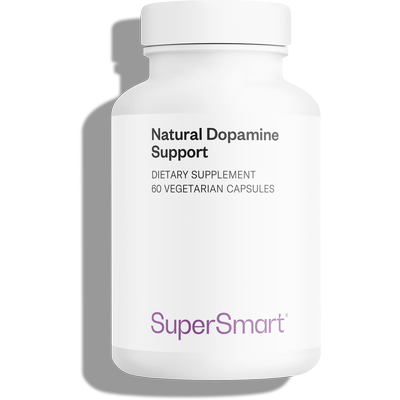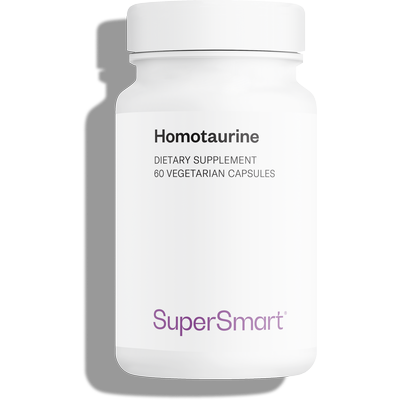Complete your selection
The supplement Nerve Comfort brings together the most beneficial compounds for neuroprotection (protection of nerve cells). Its various ingredients have been selected to help maintain healthy nerve function and reduce nerve-related discomfort.
This innovative formulation is therefore of particular interest in cases of neuropathy. Neuropathy refers to a group of disorders usually caused by damage to peripheral nerves. It can result in pain, numbness, weakness, dysfunction in affected areas, etc. The nerves in question may have been damaged by diabetes, injury or a deficiency in B vitamins.
Nerve Comfort is part of our brain and nervous system nutrition category.
Nerve Comfort, a supplement inspired by treatments for neuropathic pain
Treatments prescribed for neuropathic pain often combine medication with dietary supplements designed to boost the intake of certain vitamins and other nutrients beneficial for the nervous system.
Based on the latest scientific advances in neuropathy, Nerve Comfort offers a synergy of 6 carefully-selected compounds:
- N-acetylcysteine (NAC): this amino acid is the precursor of glutathione, the famous endogenous antioxidant. Glutathione is involved in detoxifying harmful substances and regenerating other antioxidants, and acts as a guard against various forms of cellular stress. It is thus being studied for its potential neuroprotective properties (1);
- acetyl-L-carnitine: this acetyl ester of L-carnitine is among the most recently researched and promising molecules for the relief of neuropathy. The scientific literature suggests it has analgesic (pain relief) properties through the activation of receptors in dorsal root ganglia neurons (modulating the transmission of pain signals). It is also thought to be effective for loss of sensitivity (2);
- benfotiamine: this form of vitamin B1 supports normal nervous system function by improving energy metabolism within nerve cells. Deficiency in vitamin B1 typically manifests in loss of feeling in extremities and burning pains (3). As well as being a more bioavailable form of vitamin B1 than the ‘classic’ thiamine, benfotiamine appears to offer protection against damage induced by nerve protein glycosylation, a process often accelerated in neuropathy;
- alpha-lipoic acid: in studies of neuropathy sufferers, researchers have examined the potential of alpha-lipoic acid (an endogenous protector naturally present in human cells) to scavenge peripheral nerve lipophilic free radicals and regenerate nerve fibres. This compound appears to be particularly effective in diabetics, in whom uncontrolled hyperglycaemia induces oxidative stress which impairs blood flow to neuronal cells and causes neuroprotective antioxidant enzymes to become glycated (hence the frequently-observed peripheral nerve damage) (4);
- magnesium bisglycinate: magnesium supports the normal nervous system and psychological function. Studies suggest this mineral can stabilise calcium channels, exert anti-inflammatory effects and block NMDA receptors, thus reducing nerve hyperexcitability and pain transmission (5). The form selected, magnesium bisglycinate, is recognised for having the highest bioavailability and for being very well tolerated by the digestive system;
- methylcobalamin: this form of vitamin B12 also plays a role in the normal nervous system function by supporting the repair and regeneration of nerves as well as the synthesis of the myelin sheath (which surrounds the nerve). A lack of vitamin B12 is closely associated with the development of peripheral neuropathic disorders (6). The form of vitamin B12 selected, methylcobalamin, has the advantage of being directly usable and easily absorbed by the body.
Neuropathic pain: what are the symptoms?
Characteristics of chronic nerve pain
There is no definitive biological marker for neuropathic pain, with diagnosis based primarily on the patient’s own description of his or her pain. However, guidelines summarise the main characteristics of neuropathic pain to help practitioners recognise it.
Neuropathic pain: typical examples
- burning-, cold- and/or electric shock- type pain;
- tingling, prickling, numbness or itching in the affected area;
- partial or total loss of sensitivity to touch in the painful area (hypoesthesia or anaesthesia);
- increased pain perception in response to normally painless stimulus (allodynia) (7).
What causes neuropathic pain?
While there is significant variation in the aetiology of neuropathic pain, several common causes have been identified:
- stroke and brain tumours;
- diabetic neuropathy in the case of poorly-controlled blood sugar levels, which manifests in peripheral polyneuropathy (8);
- post-herpetic neuropathy following shingles (9);
- localised nerve compression: tumours, fractured vertebral discs (neuropathic pain in the legs), impairment of the median nerve in the hand (carpal tunnel syndrome);
- damage to the spinal cord (accident, multiple sclerosis…);
- certain surgical procedures (thoracotomy, mastectomy, spinal surgery …);
- some forms of chemotherapy which exhibit neurotoxicity (10);
- deficiency in certain B group vitamins (especially B1, B6 and B12) (11).
What is the difference between neurological pain and neuropathic pain?
The terms neuropathic pain, neurogenic pain and neurological pain all mean the same thing. Unlike ‘nociceptive’ pain, they are not triggered by a direct attack on the body (inflammation, trauma, infection...) but by damage to pain detection circuits. Their onset is secondary to damage to or dysfunction of the nervous system (brain, spinal cord or nerves) (12).
What is in Nerve Comfort
Any questions?
Our team of nutrition experts and scientists has the answers.
Persistent chronic pain
Except for ‘mechanical’ nerve compression, which is sometimes resolved by surgery or by shrinking a tumour, it is unfortunately rare for neuropathic pain to disappear completely. On the one hand, damaged nerves do not regenerate automatically. On the other, neuropathic pain responds poorly to both conventional analgesics (paracetamol) and opiate derivates, thus making its management complex (13).
What conventional treatments are there for relieving neuropathic pain?
It is, however, possible to reduce the perception of pain and regain a better quality of life. Current therapeutic strategies normally combine medication (anti-epilepsy drugs, antidepressants, lidocaine patches, capsaicin patches, administration of Botox for localised pain…) with non-drug treatment (transcutaneous or transcranial electric stimulation…) (14).
Unwelcome side effects
It should be pointed out, however, that these classes of drugs carry the risk of significant side effects (drowsiness, dizziness, tremors, coordination problems…) (15-16). They should therefore be introduced gradually under close medical supervision, increasing the dose slowly over several weeks.
For diabetic neuropathy
For those suffering from diabetic neuropathy, regulating blood glucose levels is critical. Plants such as banaba (in the supplement Glucofit™), which supports glycaemic control, or berberine from barberry, which promotes carbohydrate metabolism, can provide valuable support (with the approval of your diabetes specialist) (20-21).
For curbing nerve inflammation
To slow down the nerve inflammation that underlies neuropathic disorders, you could also try turmeric, which through its curcumin content, has antioxidant and anti-inflammatory properties (Curcumin Solution has a form of curcumin 185 times more bioavailable than the standard form) (22). Alternatively, you can find it in synergistic formulations (such as InflaRelief Formula, in which turmeric is combined with 11 other natural substances targeted at inner balance).
- ask your GP to refer you to a specialist pain clinic. The pain management expertise available at such clinics offers a more comprehensive response through a multi-disciplinary and tailor-made approach which allows for constant review of the therapeutic strategy;
- monitor your glycaemia if you have diabetes. The prevention of diabetic neuropathy requires regular checking of blood glucose levels, sudden rises which affect nerve tissue integrity;
- consider physiotherapy. Physio sessions help to prevent muscle atrophy in limbs affected by neuropathy, reduce sensitivity to pain and maintain a degree of mobility (17) ;
- try alternative complementary approaches. Some people find that hypnosis, acupuncture or mindfulness meditation provides some physical and mental relief (18);
- improve your stress management. Neuropathic pain and stress appear to be interconnected (19). When chronic pain leads to anxiety and depression, behavioural and cognitive therapies can be beneficial.
december 14 2025
Les comprimés sont très gros, même coupés en deux et vraiment très chers… j ai trouvé ailleurs l équivalent beaucoup plus facile d utilisation, moins cher et français
december 1 2025
Produit très efficace pour des lésions des terminaisons nerveuse suite à une opéra t ion du fémur, avec douleurs nocturnes névralgiques importants, un soulagement des les premiers jours d'utilisation.
october 17 2025
Merci pour ce produit de qualité, je suis des contente, car après une fracture du col de fémur et l'opération, j'avais toute cette jambe qui tremblait ainsi que des douleurs névralgique au genou et la cheville syndrome algodystrophie, c'est grâce à nerveux confort que tout est rentré dans l'ordre plus ces douleurs et plus de tremblements. Fantastique.
october 15 2025
Pour l'instant utilisé depuis 3 mois. J'attends un peu plus au niveau des douleurs. Il faut du temps.
october 12 2025
je n'ai pris qu'un mois car rupture de stock je pense qu'il faut au moins trois de cure je recommencerais
Need help?
You may also like

